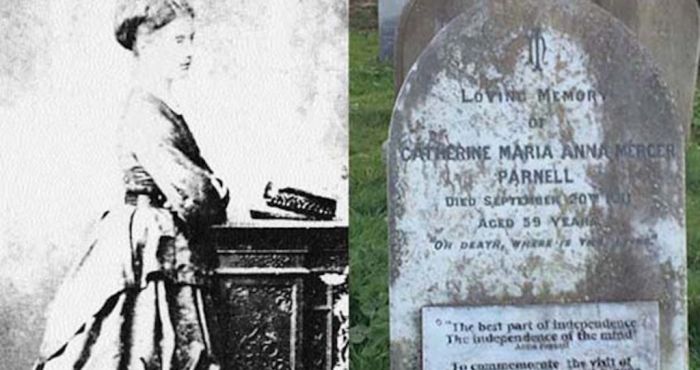Women Writing War: Ireland 1880 – 1922
edited by Tina O’Toole, Gillian McIntosh, Muireann Ó Cinnéide (University College Dublin Press, €30)
This is a collection of essays about war written from a feminist perspective. In the opening essay Diane Urquhart focuses on Anna Parnell, an archetypal feminist firebrand. Born in 1852, Anna was a sister of Charles Stewart Parnell.
With others she founded the Ladies’ Land League in 1881. Its aim was the same as that of the Land League, namely to protect tenants and abolish landlordism. More than five hundred branches were established in Ireland and among the Irish diaspora.
A formidable public speaker, in addressing ‘Protest Meetings’ she was most intemperate in her language, abusing and fiercely attacking the British prime minister and other leading politicians, never taming her anti-Englishness even for British audiences. Her rhetoric was at its most intense after a disappointing Land Act in August 1881 and the widespread arrest of Land Leaguers.
Parnell was alarmed by the militancy of his sister and her colleagues, and effectively closed down the Ladies’ Land League in August 1882. As a result, Anna became permanently estranged from her brother, left Ireland and settled in the south of England, where she died in a drowning accident at Ilfracombe in 1911. Before she died she had been living in the area alone, anonymously and forgotten.
The Parnell Society revived her memory by unveiling a plaque on her headstone in 2002 which saluted her as a true Irish patriot. Regrettably, this is not adverted to by Diana Urquhart.
Interest
Ríona Nic Congáil traces the life of the academic Agnes O’Farrelly, a champion of equal opportunity in university education. Born in Co. Cavan in 1874, she had an interest in Irish from her early years. After teaching it at Alexandra and Loreto colleges she was appointed lecturer in modern Irish at UCD in 1909. When Douglas Hyde retired she succeeded him as professor until 1947. She was president of the Irish Federation of University Women and the National University Women Graduates Association.
O’Farrelly was an influential member of the Gaelic League, where she was a close friend of Hyde, Eoin MacNeill and P.H. Pearse. She presided at the inaugural meeting of Cumann na mBan. A friend of Roger Casement, she gathered signatures to a petition for the reprieve of his death sentence.
In discussing her work and that of other Irish-language women writers in the 1930s and 1940s, NicCongáil rather oddly describes Peig Sayers, who attended a primary school, as illiterate!
Heidi Hansson discusses Emily Lawless’ A Garden Diary, disentangling from it her responses to the ‘good and bad news’ coming from South Africa during the Boer War, which reveal Lawless as a British imperialist. Lucy Collins examines the war poetry of Winifred Letts and in a splendid piece of literary criticism shows how she sheds new light on the moral ambiguities of violent conflict. Tina O’Toole introduces lesser known women from the Glens of Antrim who were both writers and revolutionaries.
In the concluding essay Lia Mills describes her shock when she learned the extent of the violence of the Easter Rising: 485 people (more civilians than combatants) were killed, almost 1,500 severely wounded, and 100,000 had to go on relief having lost everything in the fires. She is severely critical of the heroic and romanticised version of the Easter Rising.
This is a view that would be welcomed by the other contributors to this collection of thought-provoking essays.



